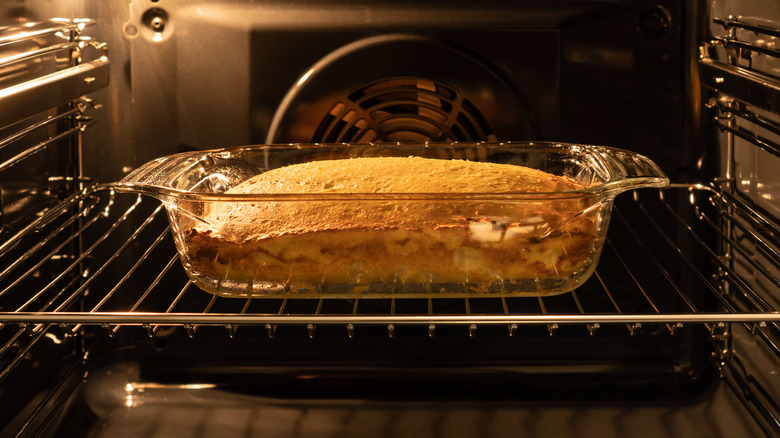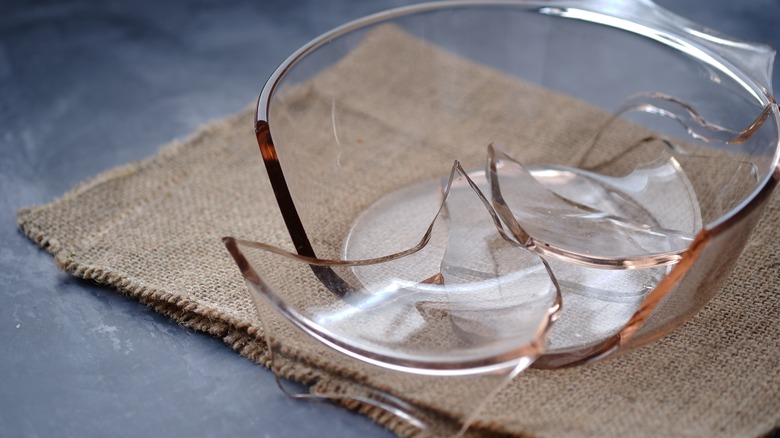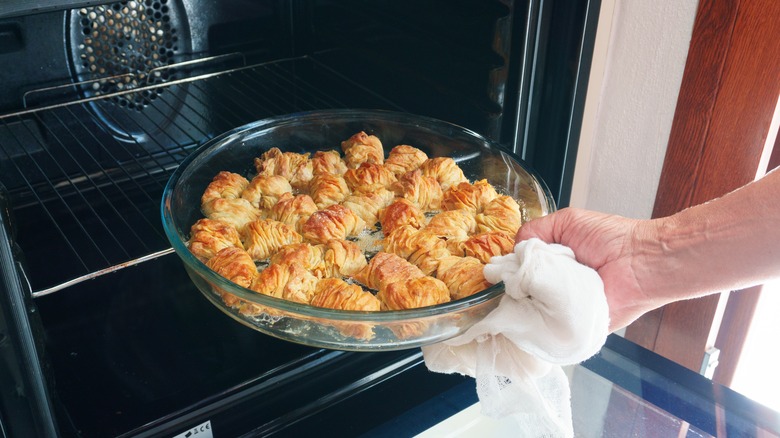The Best Way To Prevent Glass Cookware From Shattering In The Oven
Let's be honest: Baking anything in trays and pans made from glass can be a little petrifying. Despite labels that mark glass cookware as oven-safe, there have been plenty of reports of them shattering into tiny jagged piece under heat. In fact, reports of glass bakeware shattering in the oven — and even causing injuries in some cases — were so numerous that, in 2010, Consumer Reports conducted a year-long investigation only to find the matter serious enough for the Consumer Product Safety Commission to be urged into doing more thorough research.
Although glass cookware is generally considered safe to be used in the oven, the report found that the biggest problem was that any warnings and notes of caution were written in hard-to-read fine print on the original packaging that most people threw out before using the cookware for the first time. Paying attention to this fine print is important to understand just what your glass cookware can do and prevent it from shattering, but there are other steps that you can take as well.
The report listed 10 precautions that everyone could take to prevent this unfortunate situation, and it includes taking the time to preheat the oven, being mindful of the surface that you keep hot glass cookware on, and avoiding giving pans and trays any temperature shock.
These precautions can prevent any shattering
There are several reasons why glass cookware can shatter in the oven and, although the damage can seem catastrophic, it is mostly avoidable. One of the biggest culprits for shattered glass is temperature shock, or a quick and drastic change in heat or chill that can cause glass cookware to chip or explode entirely. Even if your glass cookware says that it is both oven-safe and freezer-safe, taking glass from a chilly freezer and popping it straight into a hot oven — or vice versa — is a recipe for disaster. Whether hot or cold, always allow the glass cookware to come to room temperature first before using it.
Temperature shock is also why you should always preheat the oven before you put any glass cookware inside. An oven often begins with very high heat before coming down to a more regulated temperature if it's given time to preheat. It's also ideal to never place hot glass cookware on the metal rings of a stove or directly on a counter, sink, cold and wet surface, or a damp towel. Instead, hot glass cookware should be allowed to cool on a dry cloth or a potholder.
When cooking things like meat and vegetables that don't cover the bottom of the glass cookware entirely, you should also layer the surface with liquid to provide a safety net of sorts. On the other hand, it's inadvisable to add liquids to hot glassware so, if you plan on basting a protein with broth as it cooks, it's best to choose bakeware made from another material besides glass.
Is your glass cookware truly oven-safe?
There are plenty of precautions that can prevent glass cookware from breaking in the oven, but none of it will matter if you don't check whether yours is safe to be used in such high temperatures in the first place. Not all glass cookware is designed to be used in the oven (regular glass cannot withstand heat higher than 302 to 392 degrees Fahrenheit/150 to 200 degrees Celsius). Always look for logos like that on Pyrex, which denote the cookware as oven-safe.
Even if you do find an oven-safe marking, the logo may not always be a free pass to use the glass cookware in any and all conditions. For example, some glass cookware can be marked as oven-safe but with certain limitations. For example, if you use them in temperatures any higher than a certain degree or use them in the broil setting and the glass cookware could still shatter into pieces — oven-safe or not.
This is why it's important to read the fine print and the warnings that come with your purchases as these usually indicate the upper limits of heat that the glass can be used in, the kinds of food that can be cooked inside it, and any other conditions that could shatter the glass cookware if not adhered to.



